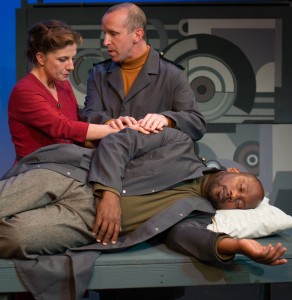Discussing rape is not easy in any context. It has scarred our collective humanity; in many societies it is still a taboo subject; it is almost too offensive to broach. Intrusion, a one-woman show written and performed by writer/actor/activist Qurrat Ann Kadwani and directed by Constance Hester, finds a way.
What If—Robots?
What would happen if technology rebelled against us? One possibility is explored in Mac Rogers’ Universal Robots, a science-fiction play set in Czechoslovakia after World War I. It is inspired by the 1921 sci-fi drama R.U.R., by the Czech playwright Karel Čapek. Čapek’s play, whose initials stand for “Rossum’s Universal Robots,” introduced the word “robot” to the English language and was instrumental in establishing the robot as a character.
Rogers expands upon Čapek’s world and creates his own universe filled with wired beings. The play eases into the realm of human-like robots in the first act. It begins with the gathering of the ensemble of robots (of which the audience is not aware) chanting of how they tell their story to remember. Remember what? This chant will surface again and connect many dots for the audience of whose story they are truly telling.
As the play opens, the characters are gathered at their local watering hole in Prague. The café is frequented by a playwright, Karel (Jorge Cordova), his sister, Jo (Hanna Cheek), who is a sculptor, and their barrage of friends. Here, they drink, laugh and discuss many of society’s conundrums. Life is good. Helena (Brittany N. Williams) enters the café, pushing a wheelchair containing an automaton, and introduces them to the object that will change their world. She asks them to come see the lab where the human-like robot was created. Their intrigue and fear grow, yet they ultimately agree to go with Helena to visit the plant and meet the automaton’s creator, Helena’s mother, Rossum (Tandy Cronyn).
After their visit, the world they know changes. They decide to embark on a mass production of automatons. They fear the loss of human employment and self-efficiency but establish ground rules to keep their creations in balance. They all agree to an established set of boundaries, and a union is formed. The robot production begins.
As the play progresses, Hitler is on the rise and a representative from the United States visits the President of the Czech Republic (Sara Thigpen), who is one of the major people in charge of the automaton project. Up to this point the group had decided that the automatons would not be used for war or programmed to kill, and now they are faced with saving millions of people or going against their values. They choose humanity—or do they?
Rogers outlines the deterioration of many of the close-knit human relationships from the beginning of the play. The pressure and guilt of programing the robots to kill prove to be too much to handle for some. One relationship with a sweet, sad dynamic is that of Jo (Hanna Cheek) and the robot Radius (Jason Howard), who was a human waiter, Radosh, who passed away and is later reincarnated as the face of the lead automatons. Radius is no longer human, but the physical association and emotions that tie Jo to Radius are very human. It brings up the question of where does humanity live, in the flesh or the soul? Howard shows versatility as he skillfully switches from human to robot with his diction and physicality. In his scenes with Jo he is able to capture the softness of a human yet parallel it with the sterility of a robot.
Rogers does a fantastic job of posing such deeply rooted questions that force the audience to really think about choices, good, evil and humanity as a whole. Rogers delves deeply into these complex themes and creation questions. He poses a hypothetical where choosing the lesser of two evils could be at the expense of humanity. Although the play deals with relevant issues, at times it feels as if he might be trying to tackle too many deep questions for one sitting.
Director Jordana Willams has put together a diverse cast of 10 in Universal Robots, a powerful, thought-provoking play that should be appreciated not only by sci-fi enthusiasts but anyone who is interested in thinking about the world’s “what ifs.”
Universal Robots runs through June 26 at the Sheen Center (145 6th Ave.; entrance on Dominick Street). Evening performances are at 8 p.m. tonight and Wednesday through Saturday; there is also a 2 p.m. matinee on Sunday. Tickets are $25 for general admission and $18 for students and may be purchased online at web.ovationtix.com/trs/pr/957321.







